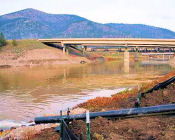

|
a |
|
- |
|
- |
|
- |
| careers |
Dewatering Pipe
Oxford Plastics manufacturers dewatering pipe for the construction, agriculture and mining industries. Are you a dewatering contractor, or a service company for the mining or construction industry and looking for a reliable source of hdpe pipe? We manufacture hdpe dewatering pipe for distribution to a variety of industrial contractors across the North East US and Eastern Canada. Our hdpe pipe is naturally suited for dewatering projects where corrosion is high and the effects of ground movement require more flexibility than can be provided by more rigid piping materials. Using the heat fusion joining method, and directional boring methods, our dewatering pipe provides a leak free system that can be installed in environmentally sensitive areas without disturbing local businesses and communities.
Applications:
What is Dewatering Pipe?
In a very strict sense, dewatering pipe is any pipe used to remove water
from a solid. It also has been used to refer to the process of removing
water from a lake, river, stream, reservoir, or a solid waste lagoon.
A mining contractor, for example, would probably say that dewatering pipe
is any pipe used to transfer water from slurries, sludge or wastewater
solids. From a general construction or agriculture point of view, its
the pipe used in the natural, chemical, or mechanical removal of water
from a solid. That solid might be soil in a marshland, solid waste in
a landfill, sludge or extremely polluted wastewater. Dewatering has a
number of benefits from lower transport and disposal costs, to less offensive
odors and cleaner water. Dewatered solids are cheaper and much easier
to incinerate. In landfills, dewatered solids take up less space, produce
less leachate and other forms of pollution.
Advantages of Using Hdpe Dewatering Pipe
Using dewatering pipe often involves in construction in unstable areas
where conditions are less than ideal and it is hard to move around heavy
equipment. Construction near an ocean front or in a marshy area, for instance,
often requires a significant amount of dewatering pipe to stabilize excavation
efforts. Since hdpe dewatering pipe is heat fused together, its joints
are self-restraining and do not require thrust blocks, making it ideal
for these kinds of conditions. The soil in these areas is also fairly
corrosive which can reduce the life span of other piping materials. Hdpe
dewatering pipe is not only corrosive resistant and strong enough to handle
unstable soil conditions, it is extremely light and flexible. Its flexibility
allows it to resist the effects of ground movement better than more rigid
materials. Hdpe pipe also has a high strain allowance, which reduces the
chance of breaking pipes due to water hammer effect. Its light weight
and leak free construction make hdpe pipe ideal for wetlands that are
environmentally sensitive. In order to avoid any disturbance to the land,
contractors often use directional drilling methods to install the pipe
Dewatering Pipe Applications
A typical form of dewatering is the removal of the sludge to a mix or
holding tank where the sludge is pumped across a shaker screen or through
a grinder to remove or crush any debris. When needed conditioning chemicals
are added to the tank and then pumped to the dewatering unit. The dewatered
solids go into appropriate containers and the removed water is disposed
in a proper manner. In recycling or land recovery applications, dewatering
pipe is installed to remove excess water from contaminated soil, sediment,
or other material. This reduces the mass and volume of the waste material
making it easier to dispose of. Another popular use of dewatering pipe
involves the clearing or emptying of a storage lagoon that holds all sorts
of waste materials from industrial or commercial activities. These can
include waste lagoons from municipalities, food processing, oil processing
and construction sites. Dewatering pipe can also be used in a preventive
way by draining or diverting waterways or wetlands before the accumulation
of contaminated soils and sediments can occur.
Contact us today by email or our toll free number:
sales@oxfordplasticsinc.com
1.800.263.0502
|
Copyright ® 2003 - 2008 | Oxford Plastics Inc. | All Rights Reserved |
|||
|
Oxford Plastics Inc. ~ PO Box 119, Oxford Road 6, Embro, Ontario, CANADA, N0J 1J0 |
|||
|
Office: 519.423.6232 ~ Fax: 519.423.6057 ~ Toll Free: 1.800.263.0502 |